- Homepage
- Worm farms
- Cardboard in Worm-farms
Cardboard in worm-farms
Cardboard in worm-farms is to maintain the carbon to nitrogen ratio greater than 20 parts to 1.
In other words more carbon and less nitrogen is desirable.
This is generally not a problem when using only material from the garden but if you start to add waste such as chicken or meat to your feed, it raises the nitrogen-content considerably.
These nitrogen-rich wastes should never be more than 10 percent by the way.
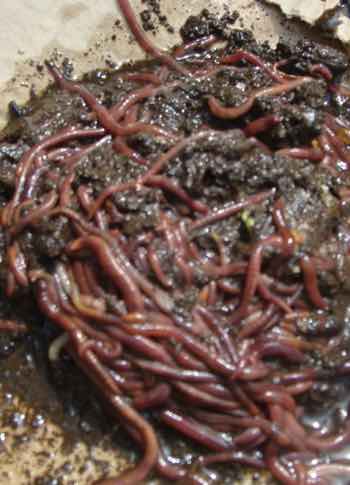
This page was last updated by Bernard Preston on 9th August, 2023.
This can happen, for example, if you are using scraps from a restaurant in your worm-farms; they would often be high in waste that has too much nitrogen. Cardboard or paper, or even cabbage leaves, are the solution to compensate by raising the carbon content.
Avoid adding seafood and dairy products to your worm-farms.
The cardboard in your worm farms should first be soaked in water and then shredded manually into smaller pieces so that the wrigglies can easily access the food.
Some folk like to soak the cardboard overnight first; the worms can then crawl more easily through the waste, letting in air.
An anaerobic environment is not desirable; it's toxic for the worms and releases unpleasant odours.
A sure sign that this is happening is if you notice the worms are crawling out of the farm.
Whilst generally not a problem, some management of your worm-farms is necessary; as a rule they are very tolerant little creatures.
When turning the feedstock, I prefer to use a garden-fork rather than a spade; you are less likely to injure the worms which can happen very easily when manipulating the vermicompost.
Cardboard in worm-farms
Cardboard in worm-farms, known as a "bulking agent" should consist of about 20 percent of the feed given to the wrigglies; it also helps control the water content.
Making the contents of the waste material more porous allows the worms better access through the vegetable matter, enabling them to reach undigested food more easily.
Mix the cardboard in your worm-farms thoroughly into the waste, not just placing it on the top; in fact it's even more important deeper in the trough where they might not get enough oxygen.
If you are using only garden waste like grass cuttings, then you do not need cardboard in worm-farms.
If your worm-farms are too wet then air cannot penetrate deeper into the waste food; cardboard helps to maintain a more suitable environment for the little creatures.
This can happen if too much rain can penetrate the container; watch to see if a large amount of dilute leachate is collecting in the bucket.
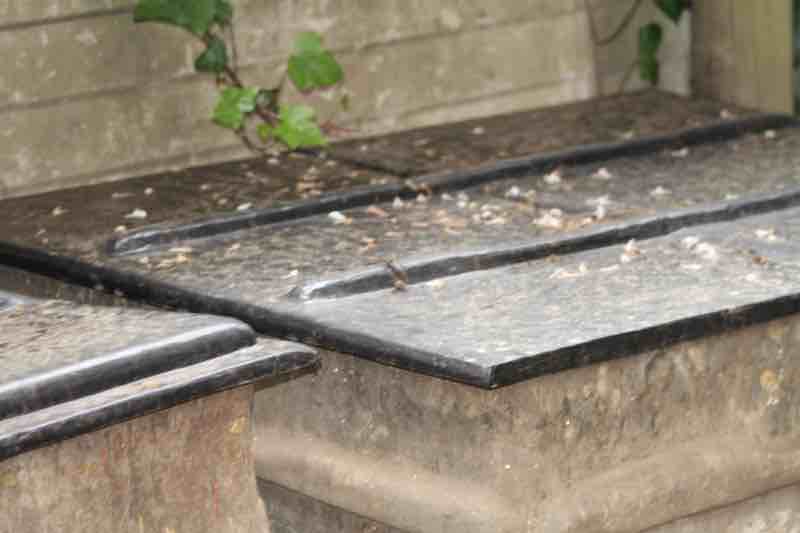 Rainproof covers for worm-farms are important.
Rainproof covers for worm-farms are important.The cardboard also retains water helping to prevent the worm farms from drying out.
It's generally kept to around 20% of the feed but this can be increased if more meat or bread is being used; together these foods should not constitute more than about 10 percent of the waste.
How often you feed your worms needs to be managed. Small amounts of kitchen waste and garden organics can be given daily; personally I go to the opposite extreme, just because it's convenient, providing a lot of food once every six-weeks. Again, watch to see if they start to crawl out of the container.
Overfeeding can be a problem especially in winter when they reproduce more slowly; a sure sign will be an unpleasant smell if the worms are unable to cope with the excess food.
We often collect several bags of the outer leaves of cabbages from the greengrocer; chopped a bit with a garden spade, they too will be an excellent bulking agent, less likely to have any contaminants that may be in the cardboard. That provides air in the worm farms; essential as they are aerobic creatures, same as us. The husks around corn are fine too.
Both the leachate and the vermicompost will greatly enrich your garden soil.
Compost heaps in late winter are most easily worked when the humus is light and dry.
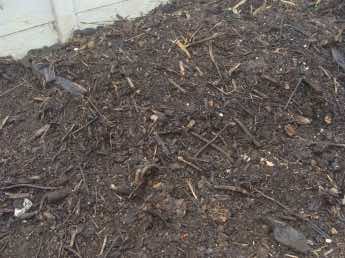
Germination of seeds improves and your plants will take off when grown in vermicompost; or watered with the diluted leachate.
The primary purpose of our worm farms is to provide protein for our hens; the vermicompost and leachate are byproducts that have turned out to be more important than we initially realised.
The establishment of our worm farms was thus basically for the chickens in the garden.
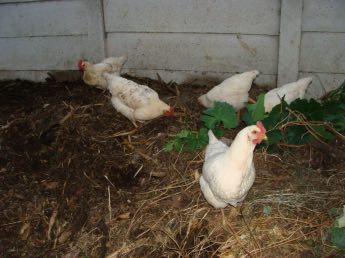
These rainbow worm farm experiments proved far more interesting than we anticipated; lots of colour and far more flowers. It also has meant better vegetables and fruit too.
It is difficult to find trustworthy sources of organic food; our solution is to grow and produce as much of our own as possible. It has become an abused term, just a marketing tool of little significance unless you know the farmer.
Best chicken feed includes protein from the worm farms which means you need a supply of a bulking-agent like cardboard. We now in fact use cabbage leaves or corn husks rather.
A time to sow
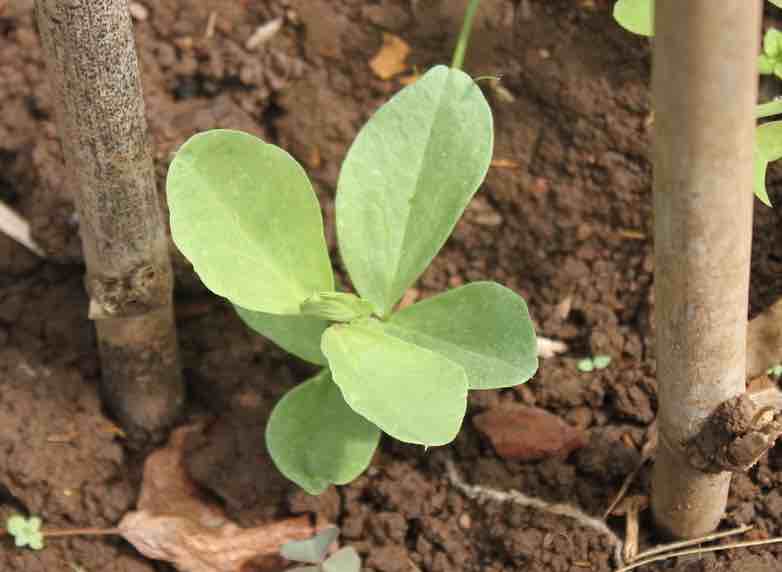 Broad beans can provide most of a family's need for protein.
Broad beans can provide most of a family's need for protein.It is not unreasonable to consider that extreme hardship lies in the not too distant future; climate change, hunger and drought. It's a time to sow in the garden; even a relatively small patch can make an enormous difference.
It's all about hard work, fertility and water for irrigation; and our mental health. Worm-farms can make a significant contribution.
"What if a walk in a green environment could reshape brains, recalibrate sense of time and stave off mental health conditions? If the research trends are true, doctors might soon find themselves writing prescriptions of 20 minutes of nature per day."
- Dr William Bird, MD, MBE
The material expressed on this page is gleaned from the nutritional and environmental literature; it is clearly referenced. A plain distinction is made between the author's opinion and that which is scientifically proven. When in doubt consult your health professional.
To suggest a correction or clarification, write to Dr Bernard Preston here. Contact.
When browsing use right click and "Open Link in New Tab" or you may get a bad gateway signal.
Newsletter
Our newsletter is entitled "create a cyan zone" at your home, preserving both yourself and Mother Earth for future generations; and the family too, of course. We promise not to spam you with daily emails promoting various products. You may get an occasional nudge to buy one of my books.
Here are the back issues.
- Lifestyle and ideal body weight
- What are ultra-processed foods?
- Investing in long-term health
- Diseases from plastic exposure
- Intensive lifestyle management for obesity has limited value
- A world largely devoid of Parkinson's Disease
- The impact of friendly bacteria in the tum on the prevention of cancer
- There's a hole in the bucket
- Everyone is talking about weight loss drugs
- Pull the sweet tooth
- If you suffer from heartburn plant a susu
- Refined maize meal and stunting
- Should agriculture and industry get priority for water and electricity?
- Nature is calling
- Mill your own flour
- Bake your own sourdough bread
- Microplastics from our water
- Alternative types of water storage
- Wear your clothes out
- Comfort foods
- Create a bee-friendly environment
- Go to bed slightly hungry
- Keep bees
- Blue zone folk are religious
- Reduce plastic waste
- Family is important
- What can go in compost?
- Grow broad beans for longevity
- Harvest and store sunshine
- Blue zone exercise
- Harvest and store your rainwater
- Create a cyan zone at your home
Did you find this page interesting? How about forwarding it to a friendly book or food junkie? Better still, a social media tick would help.
- Homepage
- Worm farms
- Cardboard in Worm-farms
Address:
56 Groenekloof Rd,
Hilton, KZN
South Africa
Website:
https://www.bernard-preston.com